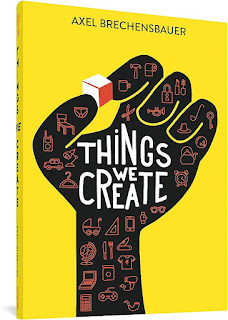Axel Brechensbauer is a designer, sculptor, concept designer - and, obviously, cartoonist. As far as I can tell, he's Swedish, but seems to work currently from a studio in Barcelona. He's thought a lot about objects, their taxonomies and how they fit into human lives. And Things We Create is how he explains, or explores, all of that: how humans make and use objects, the ways those objects can be useful or ornamental, closer to nature or further away, all those questions of desire and usability and beauty and purpose.
Brechensbauer narrates this book himself, as a cartoon-mouse avatar, on large, bright pages that often seem like posters - well, he is a designer, we should expect his book to reflect that. He's fond of taxonomy and schemas; Things is largely an exploration of various ways for dividing, classifying, or organizing objects - physical needs vs. emotional needs, for example, or things that help us work more efficiently vs. things that help us enjoy ourselves more.
It's not exactly footnoted, but Brechensbauer cites experts across a range of disciplines as he goes - Maslow's hierarchy of needs comes in early, and Nietzche makes an appearance as well - as he examines how people think about their things, and how they use those things.
He's got a distinct viewpoint, and these are clearly things he's through about, but Things isn't dogmatic: it comes across as a exploration rather than a manifesto, a guided wander through ways of thinking about stuff, as a designer talks about the ways this way of thinking is useful, and then about another way of thinking, which can help with something else.
Things is bright and clear and well-organized; it flows well and makes a lot of sense in its arguments and explications. Usually, with a book like this, there will be at least one thing that I balk at, and complain about, but Brechensbauer is reasonable and even-handed enough that I never had a moment like that. I might not find all of these schemas equally useful in my own life, but they all seem valid and plausible, especially for a working designer.
So this is a fine book for thinking about stuff, and clutter in our lives, and how we live with objects - whether you're unhappy with the number and complexity of your objects, trying to focus on truth and beauty, or some other permutation. Before I go, I should also mention Teo Jenish, who translated it: I didn't notice anything about the translation, which means it's a good one.

No comments:
Post a Comment